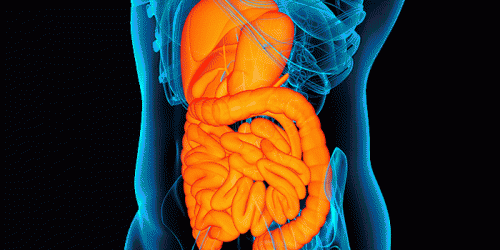August 3, 2015 report
Study describes red meat's cancer-causing mechanism in the colon

Over the past 40 years, red meat has changed roles in the American diet from a supporting player to the main attraction, increasing in both portion size and frequency of consumption. The rise in diagnoses of colorectal cancer correlates with this increase, though the mechanism by which red meat consumption results in hyperplasia is not well understood. Now a group of researchers in the Netherlands have published a study that suggests the gut microbiota, a hot subject among biomedical researchers, is pivotal in the heme-induced epithelial damage that leads to hyperplasia. They have published their results in the Proceedings of the National Academy of Sciences.
The researchers designed their study as a 2 x 2 factorial experiment with heme and antibiotics as independent factors. Mice were fed either a U.S.-style diet or the same diet supplemented with broad-spectrum antibiotics. They found that the mice subjected to antibiotics, which knocked out microbial abundance in the intestine, did not experience the damage to intestinal epithelial cells associated with development of colorectal cancer. However, the mice that did not receive antibiotic treatment showed subsequent epithelial damage and intestinal cytotoxicity associated with cancer development. What is happening here?
Heme is the cofactor that gives red meat its color. Hemoproteins have many roles in biology, but heme is poorly absorbed in the small intestine, and if it penetrates the gut's protective mucus layer, damages the epithelial surface cells. To repair the damage, the body responds with hyperproliferation of stem cells, while inhibiting apoptosis signaling between cells. Thus, the compensatory hyperproliferation leads to hyperplasia, which is a precursor condition for colorectal cancer.
But how does heme penetrate the protective mucus layer in the first place? The experiment demonstrated that the gut microbiota played a role in facilitating its breakdown. First, heme diets induce heme modification in the colon, resulting in cytotoxic heme factor (CHF). Then, the colon microbiota facilitates epithelial damage by opening the mucus barrier via hydrogen sulfide-producing and mucin-degrading bacteria. Hydrogen sulfide causes mucolysis, opening the protective mucus layer, which allows the diffusion of CHF to the epithelial surface. This leads to the induction of compensatory hyperproliferation as the body tries to repair the damage.
Thus, the mice that were fed antibiotics experienced a reduction in microbiota, including bacteria that produce hydrogen sulfide, completely preventing the chain of chemical events that results in a cytotoxic intestinal environment.
The researchers note that the diffusion barrier function of the mucosal layer is illustrated by studies in which mice were bred without this protection, resulting in the development of colitis, epithelial hyperproliferation, and the spontaneous development of colorectal cancer. Further, their model presents new approaches to diagnostics and prevention. They write, "Our model and our results imply that fecal trisulfides can serve as a suitable marker of colonic mucolysis. Therefore, it would be of interest to measure levels of trisulfides in human enterotypes… and in gut diseases in which the mucus barrier is compromised, such as irritable bowel syndrome."
More information: "Gut microbiota facilitates dietary heme-induced epithelial hyperproliferation by opening the mucus barrier in colon." PNAS 2015 ; published ahead of print July 27, 2015, DOI: 10.1073/pnas.1507645112
© 2015 Phys.org












